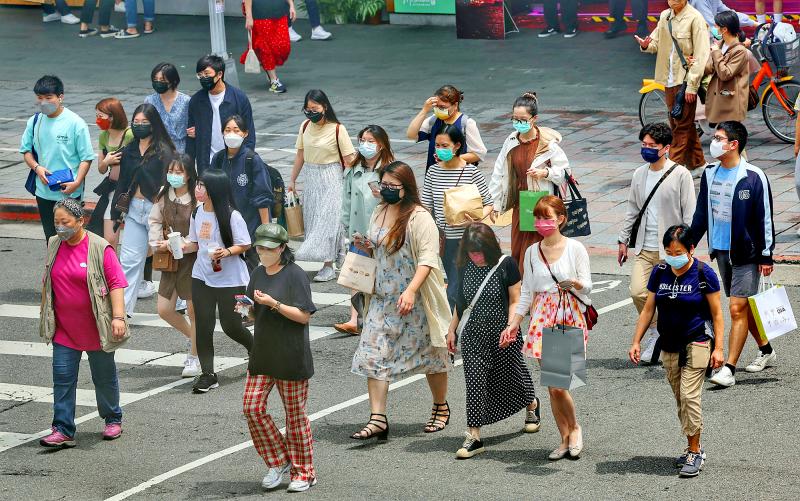About 32 percent of companies in the industrial and service sectors raised wages last year thanks to growing revenue amid a stable global economy, the Directorate-General of Budget, Accounting and Statistics (DGBAS) said on Thursday.
Citing a survey, the agency said that 34.7 percent of employers in the industrial sector and 28.7 percent in the service sector raised wages last year.
The survey showed that 76.9 percent of financial and insurance companies last year raised regular wages of employees, followed by 41.7 percent in the manufacturing industry, it said.

Photo: CNA
The pay hikes in the financial sector reflected a booming equity market last year, which boosted the profitability of many financial firms, while export-oriented tech companies raised pay as they benefited from robust global demand for emerging technologies, said Chen Hui-hsin (陳惠欣), deputy director of the agency’s Census Department.
Among the employers that raised wages, 50.2 percent based salary increases on employee performance, while 36.0 percent considered higher profits and 34.5 followed the government’s minimum wage increase, the agency said, adding that 16.8 percent considered the effects of inflation on their workers.
In the first quarter of the year, 33.6 percent of employers in the industrial and service sectors said they planned to raise wages, while 67 percent of companies with a workforce of more than 100 employees had either given pay increases or were planning to do so.
However, there is growing uncertainty about the domestic economy due to high inflation caused by a spike in commodity prices amid the Ukraine invasion and the surge of local COVID-19 cases, Chen said.
Whether wages would remain at their new levels and for how long is uncertain, she said.

‘SWASTICAR’: Tesla CEO Elon Musk’s close association with Donald Trump has prompted opponents to brand him a ‘Nazi’ and resulted in a dramatic drop in sales Demonstrators descended on Tesla Inc dealerships across the US, and in Europe and Canada on Saturday to protest company chief Elon Musk, who has amassed extraordinary power as a top adviser to US President Donald Trump. Waving signs with messages such as “Musk is stealing our money” and “Reclaim our country,” the protests largely took place peacefully following fiery episodes of vandalism on Tesla vehicles, dealerships and other facilities in recent weeks that US officials have denounced as terrorism. Hundreds rallied on Saturday outside the Tesla dealership in Manhattan. Some blasted Musk, the world’s richest man, while others demanded the shuttering of his

TIGHT-LIPPED: UMC said it had no merger plans at the moment, after Nikkei Asia reported that the firm and GlobalFoundries were considering restarting merger talks United Microelectronics Corp (UMC, 聯電), the world’s No. 4 contract chipmaker, yesterday launched a new US$5 billion 12-inch chip factory in Singapore as part of its latest effort to diversify its manufacturing footprint amid growing geopolitical risks. The new factory, adjacent to UMC’s existing Singapore fab in the Pasir Res Wafer Fab Park, is scheduled to enter volume production next year, utilizing mature 22-nanometer and 28-nanometer process technologies, UMC said in a statement. The company plans to invest US$5 billion during the first phase of the new fab, which would have an installed capacity of 30,000 12-inch wafers per month, it said. The

Taiwan’s official purchasing managers’ index (PMI) last month rose 0.2 percentage points to 54.2, in a second consecutive month of expansion, thanks to front-loading demand intended to avoid potential US tariff hikes, the Chung-Hua Institution for Economic Research (CIER, 中華經濟研究院) said yesterday. While short-term demand appeared robust, uncertainties rose due to US President Donald Trump’s unpredictable trade policy, CIER president Lien Hsien-ming (連賢明) told a news conference in Taipei. Taiwan’s economy this year would be characterized by high-level fluctuations and the volatility would be wilder than most expect, Lien said Demand for electronics, particularly semiconductors, continues to benefit from US technology giants’ effort

MULTIFACETED: A task force has analyzed possible scenarios and created responses to assist domestic industries in dealing with US tariffs, the economics minister said The Executive Yuan is tomorrow to announce countermeasures to US President Donald Trump’s planned reciprocal tariffs, although the details of the plan would not be made public until Monday next week, Minister of Economic Affairs J.W. Kuo (郭智輝) said yesterday. The Cabinet established an economic and trade task force in November last year to deal with US trade and tariff related issues, Kuo told reporters outside the legislature in Taipei. The task force has been analyzing and evaluating all kinds of scenarios to identify suitable responses and determine how best to assist domestic industries in managing the effects of Trump’s tariffs, he